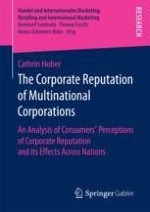2018 | Book
The Corporate Reputation of Multinational Corporations
An Analysis of Consumers’ Perceptions of Corporate Reputation and its Effects Across Nations
Author: Cathrin Huber
Publisher: Springer Fachmedien Wiesbaden
Book Series : Reihe Handel und Internationales Marketing / Series Retailing and International Marketing
